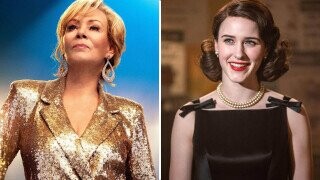5 Real-Life Comics Who Inspired Hacks and Mrs. Maisel

Deborah Vance of Hacks and Miriam “Midge” Maisel of The Marvelous Mrs. Maisel made audiences laugh in entirely different decades, but the two fictional comics were created using a lot of the same comedy DNA. In fact, their creators based both characters on a group of trailblazing comedians, at least some of whose names are largely forgotten today. Here are five funny ladies who provided the inspiration.
Joan Rivers
Deborah and Midge are based on a combination of comic geniuses, but both Hacks co-creator Paul W. Downs and Maisel actress Rachel Brosnahan list the great Joan Rivers as an influence.
“Joan emerged at just the moment when American popular culture was ready to accept that a woman could be a stand-up comedy star,” says Shawn Levy in his new book, In On The Joke: The Original Queens of Stand-Up Comedy. “In Joan Rivers, all the streams that women comedians had been working in previously came together in one quicksilver, five-foot-two-inch package of nerves, angles, jabs, and jokes.”
While Downs claims that Vance is an amalgamation of many figures, Rivers looms larger than most. The similarities between the two are glaringly obvious--both women were late-night pioneers, QVC hawkers, joke hoarders, plastic-surgery aficionados, and workaholic dog moms. There have rarely been closer comedy cousins.
Elaine May
Hacks' Deborah Vance "started as a stage act with her then-partner, kind of like a Nichols and May,” says Downs. “So there’s Elaine May in there.”
May, best known on the comedy stage for her work with Mike Nichols, “was indisputably a major instigator of a revolution in comedy the impact of which is still being felt today,” says Levy. Rather than stand-up, Nichols and May were known for helping create the rules for improvisational sketches. “She was a beguiling and mercurial and inventive and unattainable and deeply hilarious wild card.”
Deborah's dry wit and casual sex appeal can be traced straight back to May.
Phyllis Diller
Another influence cited by both show’s creators is Phyllis Diller (her actual real name!), who broke out in the 1960s to become the first woman comic superstar. Like the best of her male counterparts, she could rattle off ten jokes a minute -- or better. And we'd like to see Bob Hope pull off the sequined minidress.
Like most overnight successes, Diller’s rise to stardom took years. But when she finally hit Jack Paar’s Tonight Show in 1959, the show had her back more than 25 times in three years. “Dressed in garish stage wear that at once embraced and parodied modern fashion, with hair like a cartoon character who’s stuck a fork in an electrical outlet, her voice a cackle, her demeanor manic, her patter a firehose, she seemed a creature from another dimension,” says Levy.
Jean Carroll
While doing her research for The Marvelous Mrs. Maisel, Brosnahan “discovered a woman named Jean Carroll, who I’d never heard of. She was a whip-smart, beautiful, hilarious comedian, and I found her work as early as 1955. I initially thought that Midge must be inspired by her.”
Think Kathryn Hahn tossing off wicked one-liners in a ball gown and you’ll get the idea. “Jean was recognized, appreciatively, as the female analogue of such notable jokesters as Milton Berle, Bob Hope, and Henny Youngman,” says Levy. “And, moreover, as the only woman in mainstream show business who could be so described.”
Moms Mabley
One other comic that Brosnahan studied when creating Midge Maisel was Jackie “Moms” Mabley, a Black woman who performed for mostly Black audiences in a career that began shortly after World War I.
For decades, Moms was billed as “the funniest woman in the world” well before she was able to crossover into mainstream success. It took America a long time to catch up to Mabley, but she became “popular with white (and, impressively, youth) audiences at an age when a lot of entertainers would be thinking about retirement,” says Levy, “an overnight success, as it were, in her sixties and seventies.”
It's not hard to hear echoes of Moms' fearless truth-telling in Deborah's and Midge's monologues.
For more ComedyNerd, be sure to check out:
Celebs (And A Gorilla) On Meeting Robin Williams For The First Time
Craig Ferguson, The Inconspicuous King Of Late Night
Saturday Night Live: Season 47 Winners and Losers
For ComedyNerd exclusive content and more, subscribe to our fancy newsletter:
Top image: Universal Television/Amazon Studios
